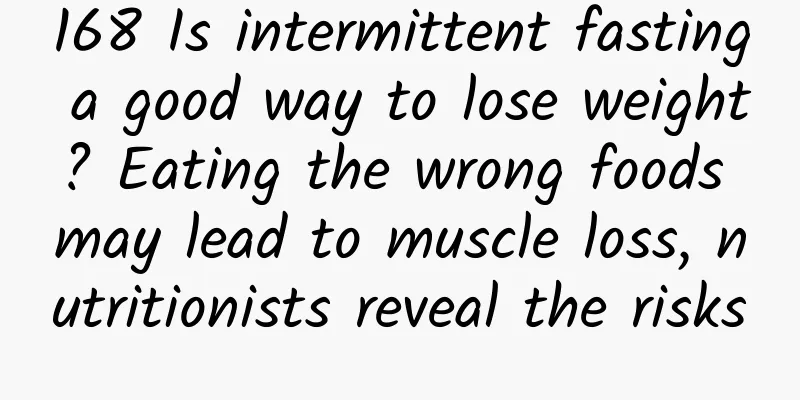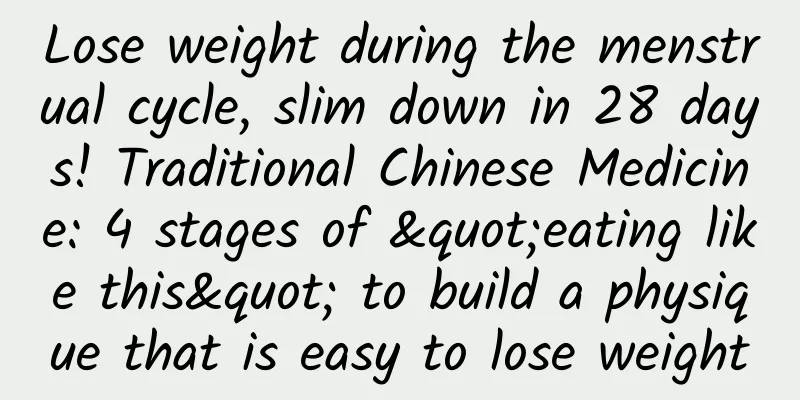168 Is intermittent fasting a good way to lose weight? Eating the wrong foods may lead to muscle loss, nutritionists reveal the risks

|
There are hundreds of ways to lose weight, and various intermittent fasting methods are favored by many people. Recently, the media reported that 68-year-old Sammo Hung actively lost weight using the 168-hour fasting method, and his figure was obviously drastically reduced... Some people even control their blood sugar through the 168 intermittent fasting method; however, some people are worried that it will cause muscle loss. What are the advantages of this weight loss method? What are the risks? Let professional nutritionists give you detailed answers. The 168 intermittent fasting weight loss method is also called the 16:8 fasting weight loss method, which means that the eating time is concentrated in 8 hours a day, and the other 16 hours are fasting. The principle is to allow the digestive enzymes and insulin in the body to fully break down food, while also giving the stomach and intestines sufficient rest time. 168 Intermittent fasting can help you lose weight quickly and improve metabolic syndrome You Weiming, a nutritionist at the Catholic St. Martin's Hospital, said that if people eat a balanced diet and get enough nutrition, they can indeed gain many health benefits by practicing 168 intermittent fasting. According to many studies around the world, 168 intermittent fasting can help lose weight and improve indicators of metabolic syndrome, including: excessive waist circumference, high fasting blood sugar levels, and high triglycerides. The 168 intermittent fasting weight loss method is also called the 16:8 fasting weight loss method, which means that the eating time is concentrated in 8 hours a day, and the other 16 hours are fasting. Since the human body cannot obtain energy from food during the fasting period, the glycogen originally stored in the liver and muscles begins to be consumed 8 hours after a meal. After the glycogen is used up during the 16-hour fasting period, the body begins to use fat and protein as energy sources. Therefore, the loss of body fat and muscle causes weight loss, which can achieve the effect of rapid weight loss in the long run. 168 Intermittent fasting has a high risk of causing "nutrient deficiency", which is especially dangerous for people who are picky eaters or have an unbalanced diet. On the other hand, the original high-sugar, high-oil, high-calorie diet is transformed into appropriate calories and protein, and by controlling the intake of starch and oil, excess body fat and visceral fat return to normal levels, reducing metabolic impedance and allowing blood sugar and blood lipids to gradually improve. People with unbalanced diets who adopt 168 intermittent fasting will experience "nutrient deficiency" However, not everyone is suitable for the 168 intermittent fasting method to lose weight. 168 Intermittent fasting has a high risk of causing "nutrient deficiency", which is especially dangerous for people who are picky eaters or have an unbalanced diet. In addition, fitness has become popular in recent years. People who exercise regularly want to use 168 intermittent fasting to control their weight, but this is actually not suitable because people who exercise regularly are usually in good shape and must supplement the various nutrients needed by the body through a balanced diet of three normal meals. The 168 intermittent fasting is affected by the restricted time for food intake, which can easily cause people who exercise regularly to not get enough nutrients, and instead become weaker and weaker. To lose weight quickly with 168 intermittent fasting, you need to meet 3 indicators Nutritionist You Weiming suggests that anyone who meets one of the following three criteria and is under the guidance of a nutritionist is suitable for using 168 intermittent fasting to lose weight quickly: The first indicator: Body mass index (BMI) greater than 27. The second indicator: men with waist circumference greater than 100 cm and women with waist circumference greater than 90 cm. The third indicator: Men with a body fat percentage greater than 30% and women with a body fat percentage greater than 35%. If people adopt 168 intermittent fasting for a long time and do not get enough nutrients needed by the body within 8 hours when they can eat, they will experience adverse conditions in their daily life, such as fatigue, lack of concentration, and desire to rest and sleep. According to the Journal of Translational Research, 168 intermittent fasting can help people lose an average of 0.25 to 0.75 kg per week. For obese people, if they stick to it for a whole year, they can lose 12 to 36 kg of fat, which is quite a lot. Will intermittent fasting of 168 hours cause muscle loss? Intermittent fasting for 168 hours can help you lose weight, but some people are worried that it may cause muscle loss. Is this true? Nutritionist You Weiming from the Catholic St. Martin's Hospital said that most studies on intermittent fasting have shown that because of the restriction of calorie intake, weight loss occurs and both fat and muscle are lost at the same time, but what is interesting is that 90% of the weight loss is fat, while muscle loss is only 10% of the weight loss. As for people who adopt 168 intermittent fasting for a long time, what health risks should they pay attention to? Nutritionist You Weiming said that in order to maintain normal physiological functions and daily life, the human body must constantly eat a variety of foods to supplement the nutrients it needs. Therefore, if people adopt 168 intermittent fasting for a long time within the 8 hours when they can eat, if they do not eat enough nutrients the body needs, they will experience fatigue, lack of concentration, and desire to rest and sleep in their daily lives. The worst thing about long-term intermittent fasting is that the body will start to "thrift" The worst case scenario is that the body experiences "thriftiness", that is, the body's metabolism slows down and the body's ability to consume calories is greatly reduced. Even if you eat less, it is not easy to lose weight. Once you eat too much, the body will enhance the absorption efficiency and then quickly gain weight again. As a result, the weight does not decrease, but the fat increases and the muscle is lost. When adopting any fasting method, you must pay attention to the optimal intake of calories and essential nutrients. Currently common fasting methods include: 168 intermittent fasting, 5:2 diet, warrior diet, 24-hour fasting, alternate-day fasting, etc. No matter which fasting method people choose, they must pay attention to the optimal calorie intake and essential nutrients they should eat. For example, for an obese person weighing 100 kg, nutritionist You Weiming recommends an initial calorie intake of 25 calories per kilogram of body weight per day, which means 2,500 calories per day. Then, the 2,500 calories should be consumed in the six major food categories according to the daily dietary guidelines to meet the body's nutrient needs. People can refer to Table 1 for the recommended number of servings of the six major diets based on calorie requirements, so that they can eat enough food with sufficient nutrients, and avoid weight loss failure and metabolic imbalance due to nutrient deficiency caused by fasting. (Form provided by nutritionist You Weiming) |
Recommend
8 factors that cause irregular menstruation. Irregular menstruation requires maintaining good living habits
If women of childbearing age are under long-term ...
Shrimp instead of eggs 7 kinds of weight loss food change
Tired of healthy weight-loss foods like eggs, app...
Briefly talk about the common care methods for irregular menstruation
Irregular menstruation is a gynecological disease...
Break through the weight loss wall! 4 tips to prevent stagnation and increase muscle endurance through weight training
Eating less and exercising more are the only ways...
What are the traditional Chinese medicines that can treat cervical erosion?
Cervical erosion is a manifestation of chronic ce...
What causes pelvic peritonitis
We don't know the causes of many diseases, so...
Yang Yizhan exercises without limits and shows off his muscles by skipping rope
Yang Yizhan, the warm-hearted urban man with a he...
Weight out of control after the New Year! 10 weight loss strategies from nutritionists
How do you spend every day during the joyful New ...
What is the problem with bloodshot after menstruation?
What happens if there is bloodshot after menstrua...
What should women do if they have cervical warts?
What should I do if I have cervical warts? The ce...
Taking a hot spring bath during menstruation and within 4 days before and after can cause vaginitis
Women can often soak in hot springs to maintain t...
What are the symptoms of lichen sclerosus vulvar leukoplakia?
Patients with hyperplastic and atrophic vulvar le...
Is it dangerous to have an ectopic pregnancy?
Ectopic pregnancy is also called ectopic pregnanc...
The causes of multiple uterine fibroids How do multiple uterine fibroids form?
Women with childbearing experience are immune to ...
What to eat for dysmenorrhea?
What can you eat to relieve dysmenorrhea? After d...









